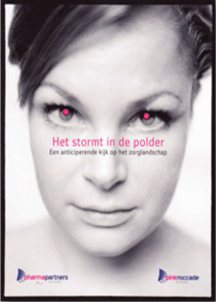Books & studies
The perfect storm in health care

HET STORMT IN DE POLDER
Together with two leading Dutch health care IT companies – PharmaPartners and PinkRoccade Health care, Benthurst & Co has dived into the question what sort of operational health care configuration is capable of delivering more and better care from substantially fewer means.”
“Health care is challenged in many countries. Aging populations, unhealthy life styles, and growing health expectations are driving up costs. This puts health care in a bit of a squeeze: how to provide more and better health care with substantially fewer means?
Fortunately the potential for improvement is universally acknowledged and proven through a variety of initiatives. Health care also enjoys the attention of the best policy makers, executives, management gurus, and extremely well educated and trained health care professionals. Despite this urgency, potential, and attention however, fundamental improvement proves elusive. This is thought provoking: perhaps if we can find out why it is so hard to get more health care from fewer means, we have the key to the solution.
That’s why we have done just that when two leading Dutch health care IT companies – PharmaPartners and PinkRoccade Health care – asked us to help develop a clear vision for the Dutch health care system. The goal of the vision was to provide them with the context for their development efforts, but also to allow them to start a dialogue with their customers and other health care stakeholders on the future of the Dutch health care system.
The result of this effort has been captured in the report (in Dutch): “Het stormt in de polder – een anticiperende kijk op het zorglandschap” (“Storm over the Polder – an anticipating perspective on the health care system”). The report can be down loaded from our site or from the report’s campaign web site www.nieuwzorglandschap.nl
THE REPORT IN BRIEF
Why does it prove so hard to get substantially more health care from fewer means despite the urgency, potential, and attention? When looking into this we found the root cause to consist of several, each other reinforcing factors:
Health care delivery is operationally extremely fragmented, more than any other industry. On top of that, this fragmentation is matched with an equal operational autonomy
Because of this, essentially all tactics to make health care fundamentally more efficient and effective have to be played out across the operational fragmentation
This deeply affects the ways of working of health care professionals and organizations and as a result, represents the ultimate transformation challenge
To make matters worse, even if the transformation challenge can be overcome, the Dutch health care system lacks the infrastructure to allow these tactics to be pursued
In short, health care reform is frustrated by the combination of profound operational fragmentation and lack of infrastructure that represents a phenomenal transformation challenge.
Tackling this transformation challenge will foremost require the efforts and support of all affected health care professionals and organizations. This will require a shared goal: a clear health care configuration that ensures that all improvement and change initiatives head in the same direction, and more importantly, start reinforcing each other. Such a starting point does not exist yet in the Dutch health care system.
Our report draws on the experience in other industries that have taken advantage of scale and infrastructural developments and uses these insights to help apply the most important tactics for improving the Dutch health care system in the most effective way. Based on this, the report sketches the contours of a more effective and efficient health care system, including the necessary infrastructure.
